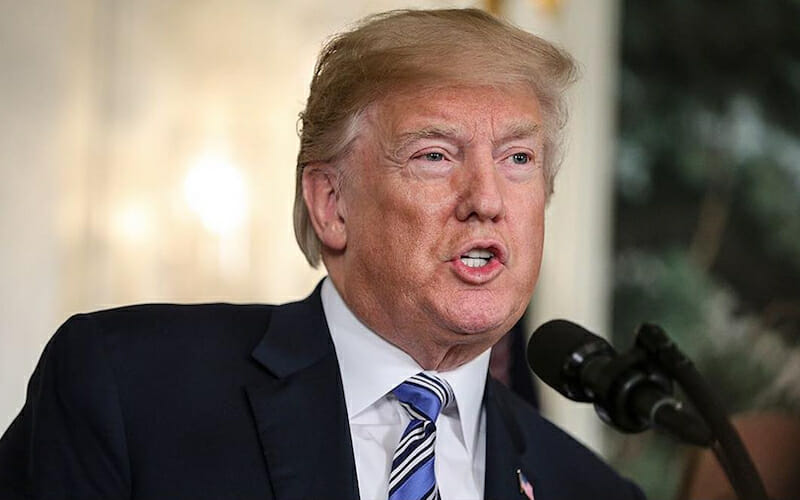
Liberals are Trump’s Best Friends
President Trump has been having a hard time organizing a functional and durable inner circle and avoiding scorns from officials within his administration. Confusion, and even disarray, is the image that the cascade of departures and leaked criticisms of his senior staff conveys. Add to this the Mueller probe and all the components for a suspense movie are met.
In the midst of the turmoil, however, the U.S. president is finding some comfort in the unintended help that he has been receiving from his ideological foes, in particular from liberals whose critiques are so biased and extravagant that they lay bare their intellectual weaknesses and lack of meaningful policy proposals.
The phenomenon has been conspicuous in the realm of foreign policy.
Syria
When President Trump launched airstrikes against the Syrian regime in April last year, in reprisal for the use of chemical weapons by that regime, the minority leaders in both chambers (Chuck Schumer and Nancy Pelosi) supported that initiative. However, their view was not supported by many numbers of their party and, accordingly, a rift on the left on this issue was brought to light.
That vivid exchange of views among Democrats on Trump’s airstrikes in Syria was in clear contrast with the dearth of critical statements, by the Democratic Party leaders, on President Obama’s failure to make good on his red-line warning regarding the use of chemical weapons by the Syrian regime.
And yet, there were reasons to be concerned with Obama’s red line recantation. That policy fiasco left the field open for U.S. rivals (in particular Russia and Iran) to meddle and advance their power in Syria, and for that matter in the Middle-East region as a whole.
U.S. Embassy in Jerusalem
Another contentious issue that shows liberals’ inconsistencies relates to Trump’s decision to move the U.S. embassy to Jerusalem.
That decision is aimed at implementing a law passed by the U.S. Congress in 1995, which provides for the transfer of the U.S. embassy to Jerusalem by 1999. Interestingly, among the liberals condemning Trump’s move, there are Democratic lawmakers who had voted in favor of the 1995 law, including Dianne Feinstein, one of its original co-sponsors. The law that they had promoted or helped to adopt was not meant to be put into practice.
Handling Kim Jong-Un
Perhaps the most evident bias of liberal Trump-bashers is the one concerning North Korea. Tons of ink were spilled against Trump’s vocal assertiveness vis-à-vis that country’s tyrant. At the same time, however, Trump detractors have not ventured to publicly admit that Obama’s “strategic patience” achieved nothing in this regard and, what is worse, allowed Kim Jong-Un to make major advances in the weaponizing of his country’s nuclear program.
Now, after the announcement of the impending encounter between Trump and Kim Jong-Un, it is difficult to deny President Trump any credit for the sudden readiness of the North Korean dictator to engage in nuclear disarmament talks with the U.S. That is not a reason, however, for liberals – including former Democratic presidential candidate Hillary Clinton – to give up their Trump-bashing: rather than welcoming the window of opportunity that the prospective summit creates. Liberals prefer to express concern for Trump’s lack of the diplomatic experience and preparedness that is needed to conduct so a painstaking a negotiation.
Make no mistake: the summit may end in a blind alley or even may not take place at all. Whatever the end result, however, the fact will remain that Trump’s immediate predecessor, for all his political expertise and diplomatic finesse, did not succeed – unlike Trump – in putting Kim Jong-Un in a negotiating mood.
Iran
Liberals also criticize Trump’s threat to pull the U.S. out of the Iran deal. As in the case of North Korea, Trump’s rhetoric has been denounced by the left-leaning politically correct. It is not sure, however, that without Trump’s assertive tone – in the antipodes of Obama’s appeasement efforts – other partners of the agreement, notably from Europe, and, more importantly, Iran, would have been willing to sit around a negotiation table to “fix” the agreement as Trump requests.
Absence of a Grand Strategy
Last but not least, liberals have voiced concern for Trump’s absence of a grand strategy in the field of foreign policy. And they may have a point. Indeed, even though a National Defense Strategy was released last January by the administration, it is not clear yet (as policy analyst Tony Badran asserts in an op-ed published on the site of the Hoover Institution) how the principles spelled out in that document will be translated into policy.
Be that as it may, a few questions deserve to be raised. Did former President Obama have a grand strategy at all? Could his “leading from behind,” and for that matter his “strategic patience,” qualify as such? Certainly not.
In the same vein, to assert that “Trump has created a temporary vacuum of global leadership,” as does Jake Sullivan – a high-ranking officer at the State Department in the former Obama administration – is tantamount to ignoring the fact that such vacuum antedates Trump’s presidency and has much to do with
Obama’s “leading-from-behind,” flawed “Asia pivot” and “Russia reset” and, no less important, his lack of resolve to make good on red-line warnings.
These incoherencies and double standards reflect liberals’ lack of foreign policy ideas, as Zack Beauchamp (Vox senior reporter and formerly a fellow at the center-left think tank Center for American Progress) contends.
No. Liberals can’t claim to have the high moral ground nor the response to the challenges of present times. Trump-bashing, as they practice, does not a coherent policy make. This is why, with enemies like them, Trump doesn’t need friends.

